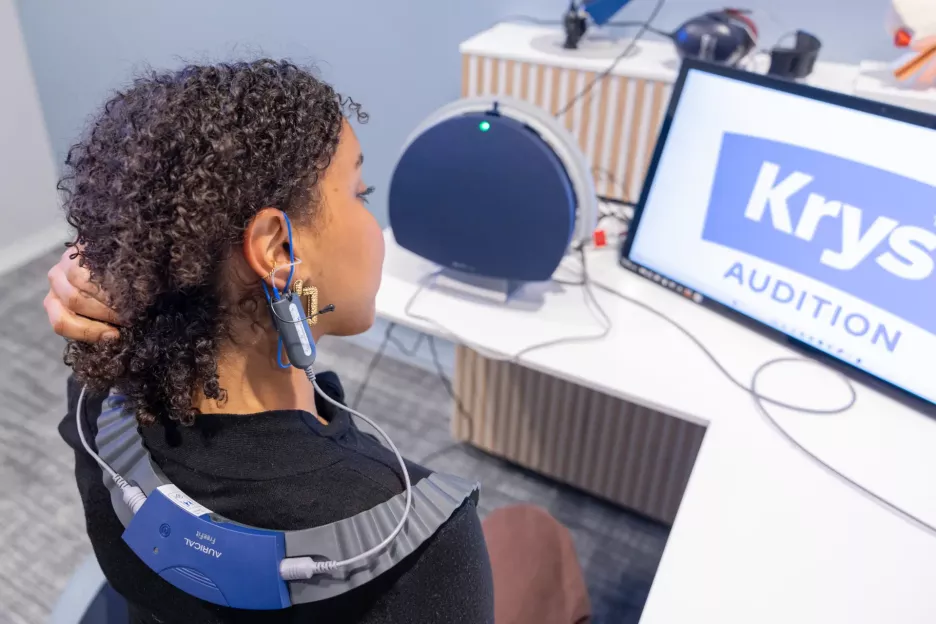Newborn Hearing Screening
There is a systematic screening program for neonatal deafness in Brazil. The country has passed several ordinances related to the National Health Policy for Persons with Disabilities (2002) and the National Hearing Health Policy (2004) to support neonatal hearing health. This led to the implementation of neonatal screening programs for deafness (2012). This program links maternity wards, diagnostic facilities and basic care units in order to coordinate the screening, diagnostic and intervention phases.
The average rate coverage of NHS in Brazilian public maternity hospitals increased from 26.7% in 2020, to 40.7% in 2021, 36.5% in 2022 and 43% in 2023. The coverage growth is linear but varies according to the regions of Brazil, and is not a reality throughout the national territory.
Presbycusis
There are several hearing programs dedicated to adults as part of public health proposals, and which concern the elderly. We call it hearing loss induced by aging, since there are many other factors involved beyond presbycusis. There are no specific programs for early detection in this population, although it may be available in private practice.

Patient and healthcare professional pathways
In Brazil, the professional responsible for all audiological evaluations (screening, diagnosis and other assessments, including vestibular and electrophysiological tests) is the audiologist.
The prescription of hearing devices is reserved for ENT specialists, but the choice and adaptation of devices (hearing aids, cochlear implants, implantable devices) as well as follow-up and rehabilitation are provided by audiologists. The audiologist degree encompasses both fields, audiology and speech therapy.
Reimbursement of audiological assessments by private insurance generally requires a prior ENT evaluation and referral letter.
Support
Hearing aids, cochlear implants and hearing aid devices are subsidized by the government in the public sector. Patients can also turn to the private sector and pay out of pocket or get reimbursed, if they have private insurance. A medical referral is necessary, whether in the public sector or through private insurance.
Quality of care
In Brazil, among the 55,045 professionals registered in the Audiology and Speech-Language Professional Regulatory Boards, 3,052 are specialized in audiology. However, this number might be underestimated, as registration is not mandatory. This figure remains insufficient given the 224 million inhabitants in Brazil. In addition, these specialists are concentrated in large centers, while there is a lack of professionals in smaller cities.
Currently, there are 261 specialized hearing rehabilitation services within the public health system, spread across 26 states, except Roraima. These services include 116 specialized rehabilitation centers (they offer at least two rehabilitation modalities, including hearing rehabilitation) and 125 centers for the rehabilitation of moderate to severe deafness. The Ministry of Health allocates approximately US$60.9 million (R$309,9 million) to finance these services.
The public health system also has a network of 33 hearing health services authorized to rehabilitate cochlear implant patients and users of bone-anchored hearing aids. Among them, 7 are qualified as Cochlear Implant Centers and 26 as Specialized Care for Hearing Impaired People.
According to data from the Ministry of Health, 94.8% of reimbursed hearing aids are intended for people over 13 years old (around 1.2 million devices delivered). And, 58.4% of cochlear implants were placed on children aged 0 to 12, with approximately 2,500 surgical interventions carried out by the Public Health System.
Teleaudiology
The use of teleaudiology is authorized in Brazil, but with restrictions, since not every procedure is permitted without the presence of the patient and depending on the procedures. It is used for the interpretation and transmission of graphics, images, sounds and data for the issuance of an opinion by a speech therapist, and the formative second opinion, which consists of a systematic response, based on literature review and the best available clinical-scientific evidence. It is also used for teleconsultation with a speech therapist, teleconsulting between audiologists/speech therapists and other health professionals, with the aim of clarifying doubts about clinical procedures, health actions and issues related to work processes, teleinterconsultation between audiologists/speech therapists, with or without the presence of the client, for diagnostic or therapeutic support and, finally, for remote monitoring, in other words remote monitoring of health parameters of medical devices under the supervision of an audiologist/speech therapist.



